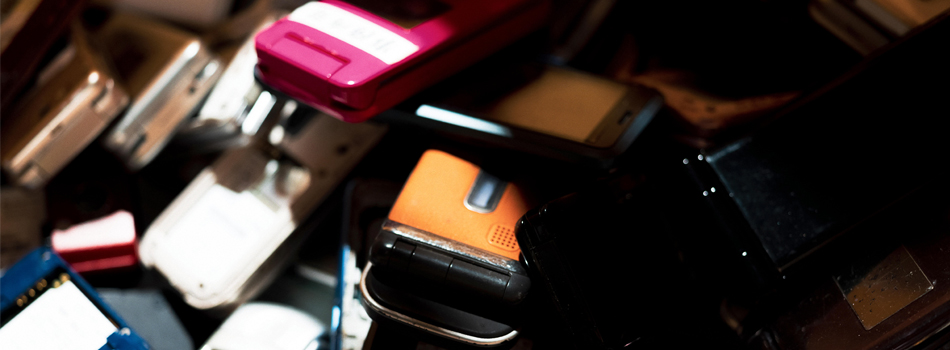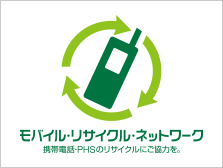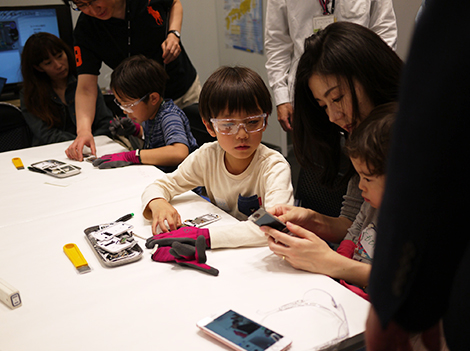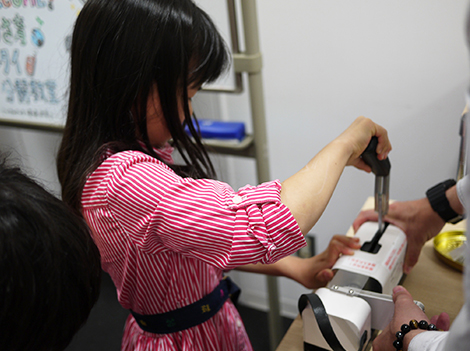Promotion of a Recycling-oriented Society


We are active in the 3Rs and Mobile Device Recycling (reduce, reuse, and recycle) to make efficient use of resources in our business operations, promoting sustainable production and consumption activities and contributing to reduced environmental impacts and the realization of a recycling-oriented society.
Waste management
We monitor, manage, and analyze the status of waste generation throughout the organization, and manage waste for optimal disposal and reuse practices. Based on the analysis results, we develop plans to reduce waste generation and continually implement, evaluate, and improve waste reduction plans. Through these efforts, we aim to achieve contributions to the environment and society, such as reducing environmental impact and complying with regulations and ordinances.
In addition, to reduce the amount of waste generated, we collaborate with various valuable item purchasing companies. Before disposing of unused items, we consult with them for assessment and strive for smooth communication, aiming to establish a system where items can be sold as valuable assets.
The 3R's
(reduce, reuse, recycle)
3R initiatives (Reduce: reduce the volume of waste, Reuse: use repeatedly, Recycle: utilize once again as resources) have started in various settings to achieve the goal. We are working to achieve a recycling based society by promoting 3R activities.
At our affiliated company SB C&S, we design and develop environmentally friendly products (PCs / mobile peripherals) through our eco-design process, such as reducing the resources materials making products smaller and lighter, and also facilitating the reuse and recycling of parts by making the structure easy to disassemble.

Promoting 3R activities
in mobile telephone services
Reduce
We strive to reduce the amount of paper resources used in the sales of mobile information devices by making individual packing boxes smaller, converting instruction manuals and other bundled documents to applications, and utilizing iPads in our stores.
Moreover, to replace the conventional paper-based invoices, we launched an “online charges guide” starting with the October 2006 statement which allows users to view electronic billing statements over the Internet from a SoftBank mobile telephone or PC. This is provided as a basic service to all individual subscribers.
Reuse
We promote trade-ins of previously used and functional mobile telephones and tablets during model upgrades, etc.
Processing all mobile telephones and tablets which are still usable as waste material increases the environmental loading. Because even older devices which are no longer in demand within Japan can be effectively put to use overseas, trade-in devices are refurbished and reused primarily in developing countries.
Recycle
Collection of used mobile telephone handsets and battery packs, etc.

As a member of the Mobile Recycle Network (MRN), an organization which engages in mobile telephone and PHS recycling activities, we promote the collection of used mobile telephone handsets, battery packs, chargers, USIM cards, and other items. In order to promote collection of handsets, we are investing in the creation of an environment to promote collection of handsets (e.g., purchasing and installing special equipment) at our directly operated and agent SoftBank stores and Y!mobile stores. Additionally, we have set up operations for collection by specialized companies to further promote these efforts. To make customers feel at ease and encourage cooperation with recycling efforts, mobile telephone handsets are processed for recycling by being physically destroyed with a “mobile telephone punch” during collection. In FY2023, we collected 2.57 million used mobile phones for reuse and recycling.
Promoting resource recycling
As part of our product stewardship efforts intended to reduce environmental loading, used mobile telephone handsets and battery packs are collected and go through recycling processing to recover the rare metals (palladium, cobalt, etc.), gold, silver, copper, and other resources that they contain. In addition, the remaining by-products (slugs) of the recycling process are used as raw materials for concrete cement while the plastic materials from the handsets are recycled as supplement fuel and recycled plastics.
Besides mobile telephones, we also promote the recycling of used cables, switching equipment, utility poles, and other telecommunications equipment waste material when upgrading and removing networking equipment.
Implementing educational activities to teach about recycling
We hold “Risaikuru” environmental classes for children to learn the importance of recycling through the experience of disassembling cell phones.The class is designed for children to learn about the structure and materials of cell phones by actually disassembling them, and by using the disassembled parts to make crafts, to exercise their creativity and acquire knowledge about recycling while having fun. More than 700 people have participated in the class from April 2018 to the end of March 2023.
Reasons why mobile telephone recycling is required
Mobile telephone handsets, batteries, and chargers, etc. contain rare metals (palladium, cobalt, etc.), gold, silver, copper, and many other precious resources with limited output which are reused as raw materials for components in electronic devices.
Promotion of
plastic resource recycling
One of the value creations of our material issues is promoting a recycling-based society (circular economy). As a KPI, we aim to improve the recycling rate of industrial waste, including plastics, by 1% annually.
To reduce plastic emissions and promote recycling, we are checking the status of plastic use in the value chain, identifying plastic waste emissions, and promoting reuse and recycling before disposal. Additionally, we collect mobile phones, smartphones, broadband routers, and other devices to support plastic recycling efforts.
Implementing 3R activities
at the office
Promoting green purchasing
As part of our green purchasing efforts, starting in July 2004, as a general rule we changed all of our copy paper to recycled paper products which comply with the Green Purchasing Act. Moreover, Green Purchasing Act compliant products, Eco Mark products, and other stationery supplies with environmental labels are displayed on the purchasing web site to promote the green purchasing of products with a low environmental load.
Internal reuse of furniture
and stationery
Out of a concern for the environment, a reuse shelf was installed at the entrance of the Employee Support Center on the 19th floor of our headquarters office for the purpose of controlling waste discharge. We have implemented a mechanism by which furniture and stationery which are no longer needed by various departments are collected and internally reused.
Declaration of Zero Paper
for Internal Operations
Since April 2012, SoftBank Corp. has advanced a “Declaration of zero paper usage in internal operations” and has been proactively promoting a shift to paperless operations for all paper used in internal and external procedures as well as paper used in reports and meetings, etc. Also, in April 2021, we launched the “Digitalization of Stamping Project” to further promote paperless operations.
Achieving “100% paperless” operations in the customer support center
To eliminate the risk of information leaks due to the removal of printed media, individual operations which used a large volume of paper including manuals, memos, and notices were identified and improved to achieve “100% paperless” (zero paper usage) operations within the Customer Support Center which handles private customer information. As a result, annual paper usage has been reduced by 3.12 million sheets (equivalent to 240 tree logs) compared to previous years.
Buying back unnecessary
ICT equipment
At SB C&S, we provide an “ICT Lifecycle Service” which buys back unnecessary ICT equipment as part of our ICT equipment sales efforts. Out of a concern for the environment, the purchased products are reused and recycled*, waste discharge is controlled, and they are efficiently utilized as precious earth resources and socially recycled products.
- [Note]
-
- *
The recycling rate is approximately 99.6% in the case of desktop PCs.
- *
Secured recycling box for collecting confidential documents
Instead of individually processing unnecessary documents as wastepaper, they are collected in a special locked security box for collecting confidential documents and batch dissolved at a later date to ensure security and recycling as toilet paper.
Resource-conserving initiatives
Appropriate use
of water resources
We recognize that water is both necessary for our business activities and an important resource for the local communities in which our business sites are located. Accordingly, we are addressing water risk and promoting the efficient use of water resources on a companywide basis.
The Environment Committee effectively manages water risk while conducting managerial supervision that ensures both companywide response to these risks and efficient water resource utilization.
Reducing energy and paper consumption through
White Work Style
SoftBank is engaged in reducing environmental impact through the application of information and communications technology (ICT). Through the implementation and proposal of a new way of working called White Work Style, work efficiency is improved while the volume of paper and energy consumed in day-to-day business is also reduced.
White Work Style is a service that allows employees to access internal work systems and software simply by connecting to SoftBank's network. Home PCs or personal iPhones and iPads can also be connected to an environment equivalent to the office PC, allowing flexibility in working time and location, such as teleworking from home, when on the move or from outside of the office.
Furthermore, with computer processing carried out on network servers rather than individual computers, computer power consumption can be reduced. By centralizing these servers at a large-scale data center, operational efficiency can be improved and overall power consumption will be reduced.
According to estimates by the Ministry of Internal Affairs and Communications, energy consumption from the use of office automation equipment and lighting can be reduced by 43% with the introduction of telework. Even when energy consumption at the home office is factored in, it is possible to reduce energy consumption by 14%. Through the promotion of teleworking, it is possible to reduce the amount of energy consumption throughout society. It is also an important initiative from an energy conservation standpoint.
Moreover, through the use of iPhones and iPads, documents stored on servers can be accessed as necessary. This has made it possible to reduce paper handouts and to present information in a more effective manner using video.

Pollution prevention measures
Processing industrial waste in the appropriate manner
Industrial waste generated by our business activities is properly disposed of in accordance with the Industrial Waste Disposal Law.
| Network center | We aim to reduce the final disposal volume of unneeded telecommunication equipment and construction waste by reusing them. | |
|---|---|---|
| Offices and distribution centers | Asbestos used in our offices and facilities has been investigated and countermeasures have been taken to ensure that it is at a level that does not affect human health, and we are systematically improving and removing it. In addition, we are working to complete the treatment of polychlorinated biphenyl (PCB) within the deadline set by the Ministry of the Environment. | |
Raising awareness about industrial waste disposal
We provide practical training for employees involved in industrial waste processing that equips them with the knowledge they need to comply with laws and regulations and perform appropriate disposal. We deliver this training through e-learning-based instruction concerning proper industrial waste disposal and electronic manifest systems. In addition, we have set up systems, including consultation contact points.
Amount of industrial waste
| Item [Unit] | FY2019 | FY2020 | FY2021 | FY2022 | FY2023 |
|---|---|---|---|---|---|
| Amount of generation [t] | 5,226 | 6,313 | 6,196 | 6,398 | 6,696 |
| Amount of final disposal [t]*1 | 153 | 831 | 528 | 557 | 301 |
Additional resource and waste data can be found under “ESG Data”.
- [Notes]
-
- *1The calculation method was changed in FY2020.
- *Group companies included in the boundary vary from period to period. Coverage based on the sales ratio of each group company in FY2023 is 99.5%.
- *Third-party verification has been obtained. (Limited level of assurance in accordance with ISAE 3000)
- *As a long-term goal until the FY2030, we anticipate an increase in emissions and final disposal volume due to business expansion. However, we have set targets to maintain the current level of emissions and final disposal volume through promoting recycling and collaborating with supply chain partners and waste disposal operators.
- *1
Identifying the risks
and opportunities
We have identified the risks and opportunities that resource depletion poses to our company and are managing data on environmental impacts.
| Risk | SoftBank |
|
|---|---|---|
| Supply chain |
|
|
| Opportunity | Brand enhancement through the promotion of 3R initiatives | |

